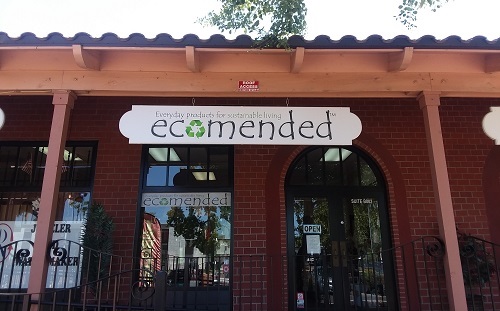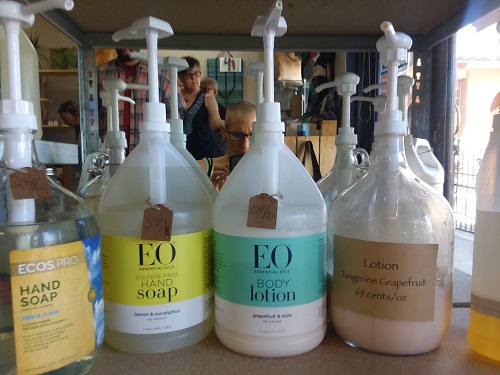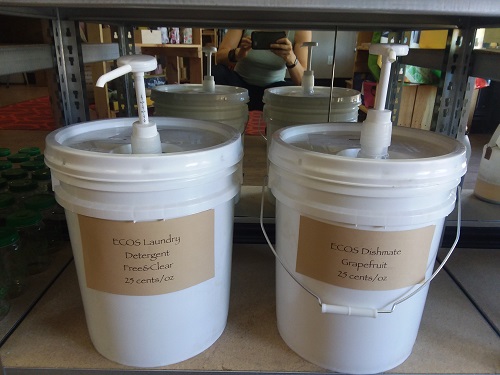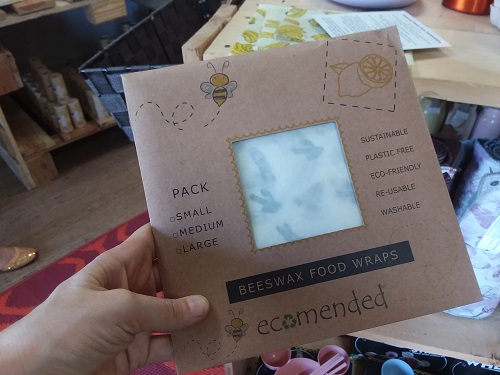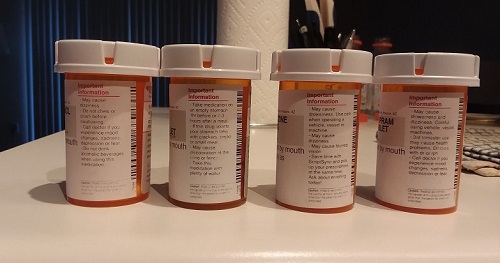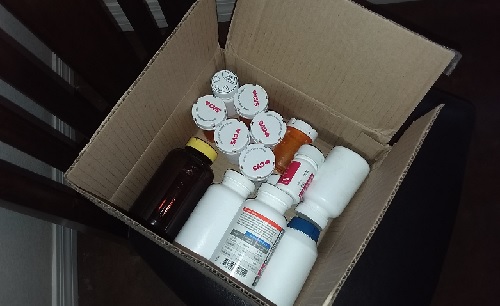
I’ve just about made to the end of Plastic-Free July: 31 days of avoiding single-use plastics. This isn’t really the end, but rather the beginning of being more conscientious about what and how I’m consuming.
Plastic comes from oil and natural gas. It doesn’t make sense that we take fossil fuels which take millions of years to create, and then use them to create products that we’re going to use for only a few minutes and then shortly thereafter, to a landfill where they’ll sit for thousands of years.
To be clear, I’m not against all plastic – just single-use plastics, the ones that are designed to be used once and thrown away – like shopping bags, product packaging, cups, and bottles.
Plastic-Free July: How’d It Go
I was not able to avoid all single-use plastics this month. My dog Rosie is, as always, exempt from my shenanigans, and there were a few times when I couldn’t find a plastic-free option for what I needed. I made my own toothpaste, but it didn’t agree with me, so I brought home my tube of regular toothpaste that was still at the office from when I did Invisalign. I have yet to find a soy-free vegan protein powder in a bulk food section, so I have to keep buying that in plastic tubs. I did, however, cut back on how frequently I have it to only the days I have a long bike ride or a long run. (I can reuse the tubs at the bulk bins in the future or donate them to Ecomended.)
The hardest thing to give up during Plastic-Free July was frozen foods, especially frozen veggies. One of my go-to meals has been canned beans, rice or quinoa, and frozen veggies – mixed and microwaved. I have not found a store that sells fresh peas, and frozen ones taste so much better than canned.
I heard good news this month about WinCo. It’s a grocery store with the most extensive and diverse bulk food bins in the Phoenix area, but you can’t bring your own jars. Thankfully, according to people who claim they’ve done it, you can bring your own bags. I haven’t had pasta all month because I can’t find a brand that doesn’t have some plastic in its packaging, but now I have a source. (They have bulk cold cereal too.)
Inspired by Plastic-Free July
Every time I don’t buy plastic, I feel like I’m saving a turtle. I feel happy every time I feel like I’m doing something to help the planet.
Doing Plastic-Free July inspired me to make little changes, like visit the refillery and look up recipes to make my own cleaning supplies. Last weekend, for the first time, I got Rosie’s chicken from the butcher counter wrapped in paper instead of the cellophane-wrapped Styrofoam. It’s the same meat, and the same price; it just took a few extra minutes to get it plastic-free. I’ll wait a few minutes to save a turtle. (I’m vegan. My dog is not.)
Speaking of Rosie, her Milkbones come in a box, with no inner plastic bag. Why can’t more human foods be packaged in a similar way, like crackers, pasta, and cereal? I shook many boxes this month, hoping to find a box with no internal plastic, but no luck.
What’s Next?
Yes, I plan to continue to avoid single-use plastics when I can. Our problems with climate change aren’t getting better, and we’re on track to have more plastic than fish in the ocean by 2050.
I want to continue to try new things, and create little challenges for myself:
- Create a trash bin liner from newspaper.
- Find an ice cream shop that has good vegan ice cream or sorbet that comes in a vegan cone/waffle bowl.
- Find a brand of 100% cotton yarn to use to make baby blankets instead of the acrylic stuff I usually use.
- Find a dry cleaner that will let patrons bring a garment bag for their clothes so they don’t have to go in plastic (bonus if we can supply our own hangers). I also messaged Rareform, which reuses billboards to make bags, and told them that I hope they make garment bags in the future. I don’t currently have a garment bag.
I plan to keep asking questions. I will ask companies that only sell their products in plastic if they’ll take back plastic container and reuse it. I will tell companies whose products I don’t use anymore that I left them for their plastic-free competition.
I want to keep learning. I want to know what chemicals are banned in other countries because they haven’t been deemed to be safe. (In the U.S., a chemical is safe until proven otherwise.)
Trying Plastic-Free Living on the Road
I’m attending a conference in a few weeks. I will call my hotel in advance and ask if the little plastic bottles of shampoo and lotion are refilled from an in-house refillery between guests. I want to use these amenities only if they’re not going to be thrown out if I do.
The conference I’m attending is excellent at accommodating attendees’ dietary needs. They regularly give me a special meal since I’m a low-soy vegan. This time around, I also ask for no plasticware (I bring my own metal travel spork), no single-use plastics (no single serving packages of chips or cookies), no food that’s cooked in plastic, and no foods that come in packaging that contains bisphenol A (BPA), phthalates, or plastics #3 or #7. (We’ve only had these things as we use them today since the 1960s or 70s.)
When I sent in the dietary update, my contact asked the obvious question: “What do you eat?†There are still a lot of foods I can have like beans, rice, lentils, nuts, fruit, veggies, bread, pasta, oatmeal, etc. I’m a big fan of PBJs and burrito bowls. I told her to tell the caterers (who I’ve been told appreciate a challenge) to think what they’d give an 8-year-old and just double the portion.
If You Want to Learn More
If you want to learn more about plastic and how to reduce the amount of single-use plastics in your life, I recommend you start by watching the documentary, “Bag It.â€
It features an everyday guy who started asking questions about plastic bags, which led to questions about single-use plastics in general. It came out in 2010, so some of the information may have changed, but from what I can tell, not much. I watched it several times during the last month.
